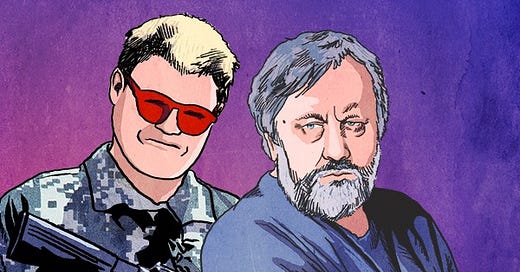Slavoj Zizek on Alex Garland's "Civil War" (Mid-Week Bonus Essay)
In a recent essay on his Substack, Slavoj Zizek offered a "belated comment" on the film. I think he's closer to being right than most critics--but pretty much everyone misses the most important point.
In a recent essay on his Substack Goads and Prods, Slovenian philosopher Slavoj Žižek offers a “belated comment” on Alex Garland’s film Civil War. (Spoilers abound.)
The movie takes place in the middle of a civil war between the federal government led by a third-term president1 and multiple secessionist movements, the strongest among them the "Western Forces" (WF) led by Texas and California; it ends with WF occupying the White House and killing the President. The story is told through the perspective of a small group of journalists travelling from New York City to Washington, D.C. to interview the besieged President, principal among them a veteran war photographer Lee Smith and Jessie Cullen, a young aspiring photojournalist. Jessie berates herself for being too scared to take photos; gradually her nerve and photography skills improve as she becomes desensitized to violence. When the two enter the half-abandoned White House, Jessie steps into the line of fire while taking photos; Lee intercedes and takes a fatal gunshot. Jessie captures Lee's death as she pushes her to safety, and then unemotionally continues into the Oval Office where a group of WF soldiers are getting ready to kill the President. Jessie is allowed to photograph the murder of the President and then the soldiers posing with their feet on his corpse.
…[T]he story can be seen as a redoubled Bildungsroman in the course of which Lee and Jessie change places. At the beginning, Lee is a desensitized reporter just interested in making good photos, while Jessie feels too much compassion to adopt such a neutral stance; at the end, Lee is shot dead while trying to protect Jessie, while Jessie fully adopts the distance of an observer and even takes a photo of Lee dying while trying to protect her. Such neutral reporting is a fake, a trap to be avoided at any price: today, engagement is more needed than ever, to be desensitized to violence means we already are part of a violent system. In Ukraine, in Gaza and the West Bank, and in hundreds of other places, only an engaged view will find the truth we are all looking for.
Many of the film’s critics, he notes, complained that
the political divisions that propel the civil war are totally muddy. The military alliance between liberal California and conservative Texas is a patent absurdity; the authoritarian third-term President combines features of a Biden liberal and of a Trump populist; apart from some casual racist remarks, soldiers that the journalists meet on their way to Washington never make a single statement that would clarify what they are fighting for… However, it would be wrong to dismiss this feature as part of a commercial strategy not to lose viewers who would be opposed to a clear political line advocated by the film.
He offers a couple of different defenses, neither of which I’d really co-sign. Even so, I think he’s closer to the mark here than all the leftists who trashed the film when it came out. Whatever Alex Garland may or may not have intended to say, I think he ended up saying something interesting.





